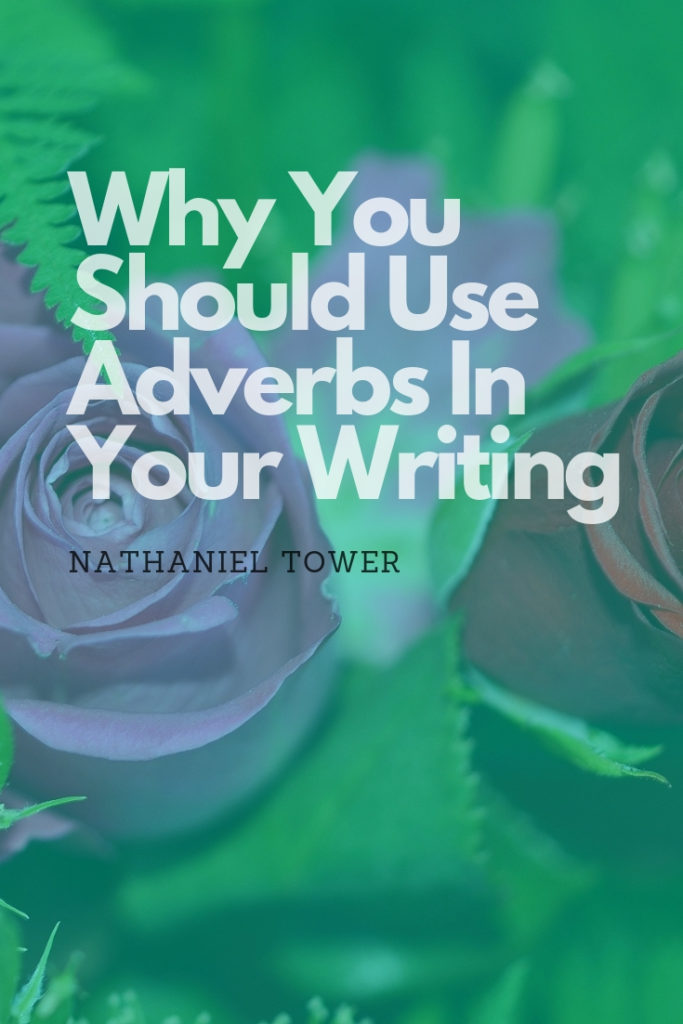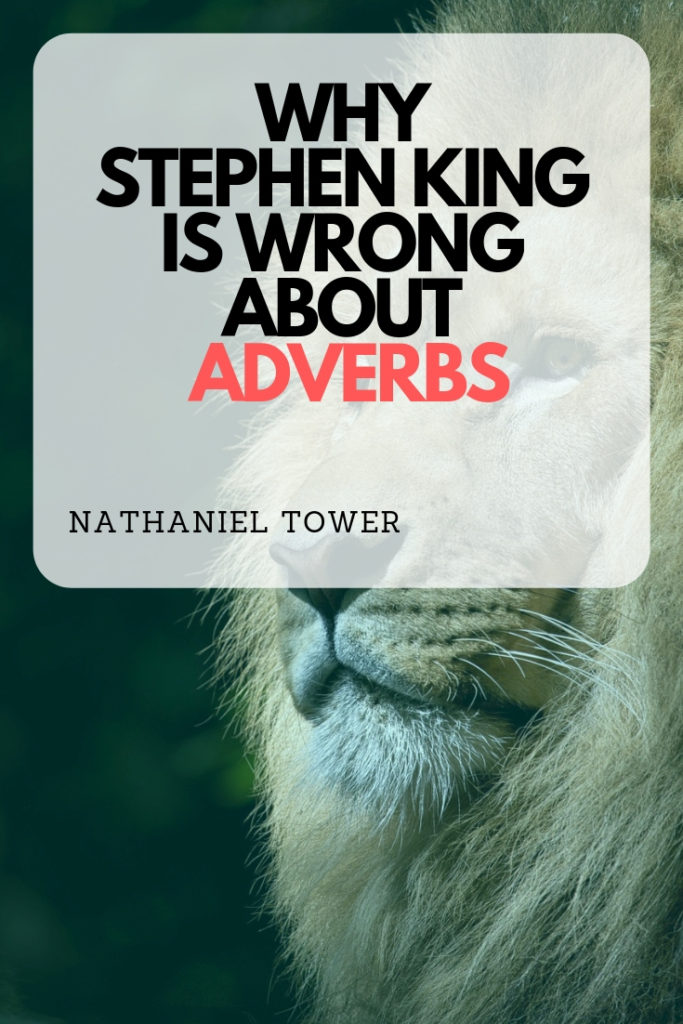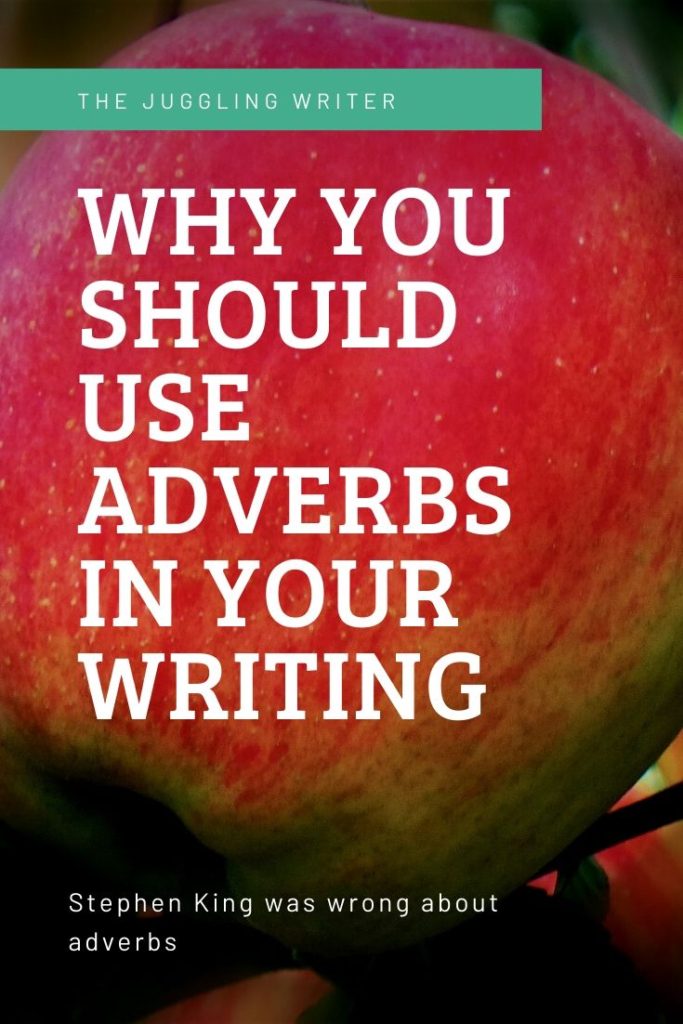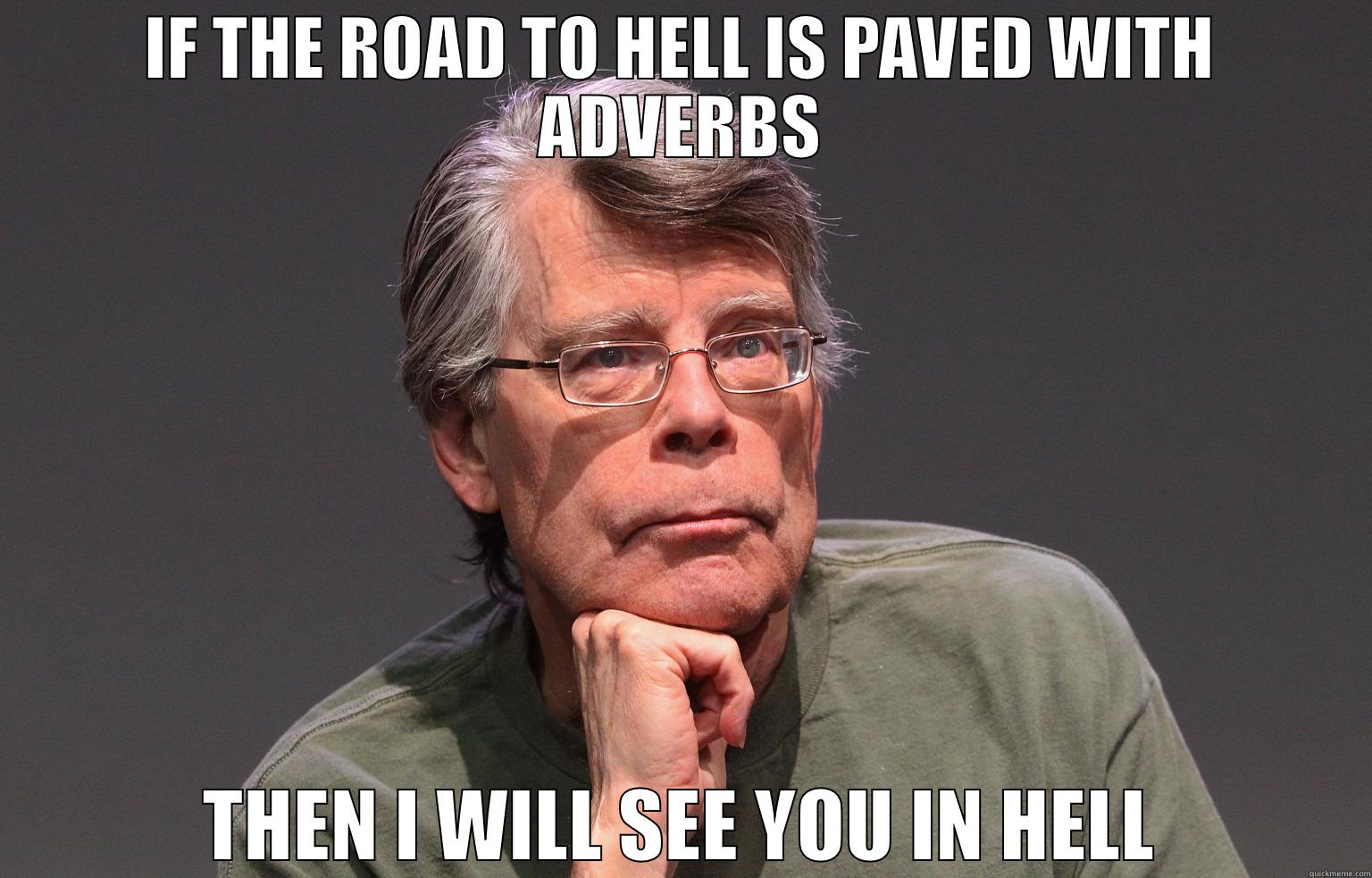Last Updated on June 3, 2023 by Nathaniel Tower
We’ve all heard that we need to avoid adverbs at all costs in our writing.
We’ve even heard that the “road to hell is paved with adverbs.” Nearly every list of writing tips from the experts—whether these experts be writing professors, famous authors, or just self-proclaimed writing gurus—contains something about brutally killing all adverbs.
During one of the many rounds of edits for my first novel, the publisher informed me that I must savagely eliminate all adverbs.
“All of them?” I inquisitively asked.
They were very firm on this. One of the absolute non-negotiables.
“But I can use a few, right?”
Only if they are truly necessary. And most definitely aren’t.
So I deleted about 99% of the adverbs, even many of the ones I thought I needed. Was my book better for it? Well, probably not.
Good writing often uses adverbs
I recently read The Shining, my first Stephen King novel. You know, Stephen King, the champion of the “no adverbs in your writing” theory. I was shockingly amazed by the number of adverbs in the novel. Some sentences contained 4 or 5 of the grotesquely horrible creatures. And you know what…it didn’t take anything away from the quality of the writing. Gasp!
Was my editor right to tell me to remove all my adverbs? Or was she maybe taking some writerly advice a bit too literally?
Pick up just about any popular or acclaimed book. Look for adverbs. I promise you will find many. In particular, I’m talking about those ugly, no-good “-ly” adverbs—the kind that all writers are trained to hate passionately—um, I mean, with a passion.
When to avoid adverbs in your writing
So why aren’t you supposed to use them in your own writing? Is this just one of those “rules” you have to learn first and then break later? If you can master writing without adverbs, then you can eventually add adverbs. Or are adverbs just the universal sign of weak writing?
Truthfully, it depends on what they are doing. If the adverbs are doing the majority of the work in the sentence, then yes, they probably do weaken the writing. Could a better action verb have done that work instead? Maybe. Could clearer dialogue have shown the reader that the character was saying something “excitedly”? Definitely.
That doesn’t mean that adverbs need to be avoided at all costs. In many cases, adverbs work quite well. In reality, adverbs are like any other word. Use them when you need them, avoid them when you don’t.
“I’m sorry,” she said sympathetically.
He slammed the door furiously.
Obviously, you don’t need those adverbs. If she’s saying sorry, we assume she is sympathetic. If he is slamming the door, we assume he is furious.
Does Stephen King Use Adverbs?
But what if you want to tell your readers that someone walked slowly? Should you say “walked slowly,” or should you look for another word, like “ambled” or “strolled”? Maybe, but maybe “ambled” does not accurately describe the character’s slow walk. You could say “walked at a slow pace,” but that can’t possibly be better than “walked slowly.” Stephen King would agree. In fact, characters did something “slowly” no fewer than 52 times in The Shining.
Moby Dick uses over 4,000 adverbs. Pride and Prejudice and The Shining each contain over 2,500. If the road to hell is really paved with adverbs, then many famous pieces of literature are eternally damned. At least hell will have plenty of interesting stories.
It’s okay to use some adverbs
Of course, no good writer—Stephen King or otherwise—ever definitively said you can’t use any adverbs. Just use them sparingly. Or, to put it more appropriately, use them necessarily. I mean, use them when they’re necessary. But the same is true for any other word or any other part of speech.
Is your book going to hell? It might not be adverbs that send it there. If your hope for a better novel is simply to delete all your adverbs, then you are headed recklessly down the wrong path.





This is an informative post. I never agreed with the “no adverbs” rule. Like you said, I’ve read many books with plenty of adverbs in them. I don’t think it takes away any quality from the novel. As long as you know when to use them and when not to, you should be good.
Thanks for reading and commenting. You have an excellent point here. If you know how to use them, then you should. The same is true for anything in writing. This is one of those writing rules that seems to have been taken to the extreme. Some writers are too quick to say “all adverbs must die!”
Thank you so much for this! (I sigh gratefully … wait. ;)) I don’t want to use adverbs (or any other kinds of words) that don’t add something to the story/text, but eradicating a word class just because a few members of it did something wrong is not my style.
Agreed. We should never eliminate something entirely just because some people have misused it. Keep using those adverbs!
I suspect it’s more to do with sloppy use of adverbs rather than anything more sinister. There have been a lot of books I’ve read where the adverb use detracted from the scene and slowed down the pace. With careful word usage you can use the to make the scene more vivid but many amateurs simply use them because they feel like an easy descriptor.
True. There’s certainly no evil plot to rid the world of adverbs. But many writers take it too literally. Thanks for reading and commenting!
His soul swooned slowly as he heard the snow falling faintly throughout the universe and faintly falling, like the descent of their last end, upon all the living and the dead.
— James Joyce, The Dead (last line)
Gosh, that Joyce could have really been something if he hadn’t used so many adverbs.
Thank you! I’m so tired of hearing “kill ALL the adverbs!” Sparing and sensible use, yes.
Should we start a “bring back the adverbs” campaign?
I figure that adverbs exist because they serve some purpose, and as long as that purpose exists in my sentence, I’ll use them. Sure, a stronger verb is usually more effective, but only usually. (Side note: King advocated adhering to the “rules” of Strunk & White, which no less than the NY Times declared dead years ago. S&W is full of inconsistencies anyway. English has moved on.)
I think what is really going on with these advocates of such “rules” is either an unexamined, knee-jerk belief or, more likely, insecurity. Writing is a subjective effort, judged subjectively, and experienced subjectively, It’s scary! How do we know if we’re doing it right? So it’s seductive when we can find “absolutes” to make us feel more confident about our creation. And I often wonder whether such “disapproval” of adverb use is an “acquired distaste.” That is, I’ve learned to dislike something that may never have bothered me before I was told the rule.
I’ve seen the same “rule” about dialog tags. Some famous writer somewhere said that a bit of dialog should never be tagged with anything more than a version of “said” if even that. WHAT? If ever there was a chance to use a strong, telling verb, the dialog tag can be it.
“I love you,” he shouted.
“I love you,” he whispered.
“I love you,” he cheered.
“I love you,” he sneered. (A said-bookism, which is also frowned upon.)
“I love you,” he moaned.
Each delivers a nuance that “said” never could.
Thank you for this comment, Paul! You have some great insight here. The dialog tag rule does seem to fall in the same boat. Limiting ourselves to “said” seems a bit extreme. I admit that I use “said” the majority of the time, but sometimes it simply isn’t the right word.
No writing rule: No more extremist writing rules!
I like adverbs, but if someone puts down “the girl danced whimsically”, it doesn’t give me anything other than whatever image of a “whimsically dancing girl” I already have in my mind whether we’re talking a drunken ballerina or a trust fund hippie named Sunshine at a Phish show. I think that’s of the crux of the problem, it’s “tell” in the disguise of “show”. But as you pointed out, like any part of speech, they’re still useful. I think you got it right when you said its one of those rules you follow until you’re good enough to break it.
Great point. Oftentimes, the context will give us the clues we need to picture that dancing girl. The adverb may be quite unnecessary. But the same could be said of many details/words. I do think adverbs can “show” rather than “tell,” but only if used correctly within the context of the story.
I enjoyed reading this post, especially since I just finished reading Stephen King’s On Writing three days ago and just started The Sirens of Titan by Kurt Vonnegut. (Vonnegut–one of my favorites–uses his fair share of adverbs.)
My thought used to be this: What’s the big deal? An adverb–even a useless one–is just one word.
But I think King is on to something when he says that someone who includes unnecessary adverbs does not trust the reader. Writing that modifies saying “I’m sorry” with “sympathetically” probably has many other, larger problems. Perhaps the writer over-describes, or writes too much backstory, or commits any number of faux pas that amount to not trusting the reader.
Right now I’m listening to an audiobook (not the Vonnegut) that uses lots of adverbs, even in dialogue attribution. I admit that I cringe a little each time I hear one — at least one that’s unnecessary. The adverbs are often long, ugly-sounding, and interruptive of the recording. (Aside: At least with audiobooks, same goes for “he said” when it’s obvious who the speaker is. The reader’s voice always comes down when adding it.)
Also, in truth, it doesn’t bother me when people suggest killing all adverbs, extreme as that is. These are people who probably see them misused over and over and over — teachers, editors, publishers, etc. And perhaps eliminating adverbs is a good window into addressing other trust issues, just as improving a batter’s awareness of his feet might help him figure out a better position for the bat. (That said, Nathaniel, if I were you, I’d probably be annoyed at getting that advice from your publisher. It’s one thing when it’s pronounced for all writers everywhere, quite another when it’s directed at an individual who obviously has a lot of experience.)
Then again, do I fault Shakespeare for writing “trippingly on the tongue”? Hell no.
So what’s the difference between a good adverb and a bad one? I’m not 100% sure. And that’s why I view them all with narrowed eyes and tightened lips.
P.S. I initially wrote “suspiciously” at the end there, half serious / half tongue-in-cheek, then wondered whether there was a way to show it. You know what? I kind of like “narrowed eyes and tightened lips.”
Hey Jonathan, thank you for sharing your thoughts. I’m glad you enjoyed the post. Vonnegut is also one of my favorites. Another adverb-heavy writer!
Adverbs can definitely be annoying at times. My creative writing students often injected adverbs into their writing when they wanted to be descriptive. Of course, they were often using the wrong adverbs or simply overdoing them.
I think you make an excellent point at the end here. Yes, we can usually accomplish what we want to without using adverbs, but that doesn’t always mean it’s better to do it that way. As writers, we need to be able to experiment with our language and structure in order to create the best version we can. Sometimes that means adverbs. Sometimes it means avoiding them.
Great post and great tongue-in-cheek humour! I agree completely, especially after observing that the Harry Potter books are replete with adverbs that, to me as a reader, did nothing to detract from the story.
Those pesky adverbs are everywhere! I guess J.K. Rowling’s publisher forgot to tell her this rule.
“Just use them sparingly. Or, to put it more appropriately, use them necessarily. ” Well played, sir! An excellent example of how adverbs should be used.